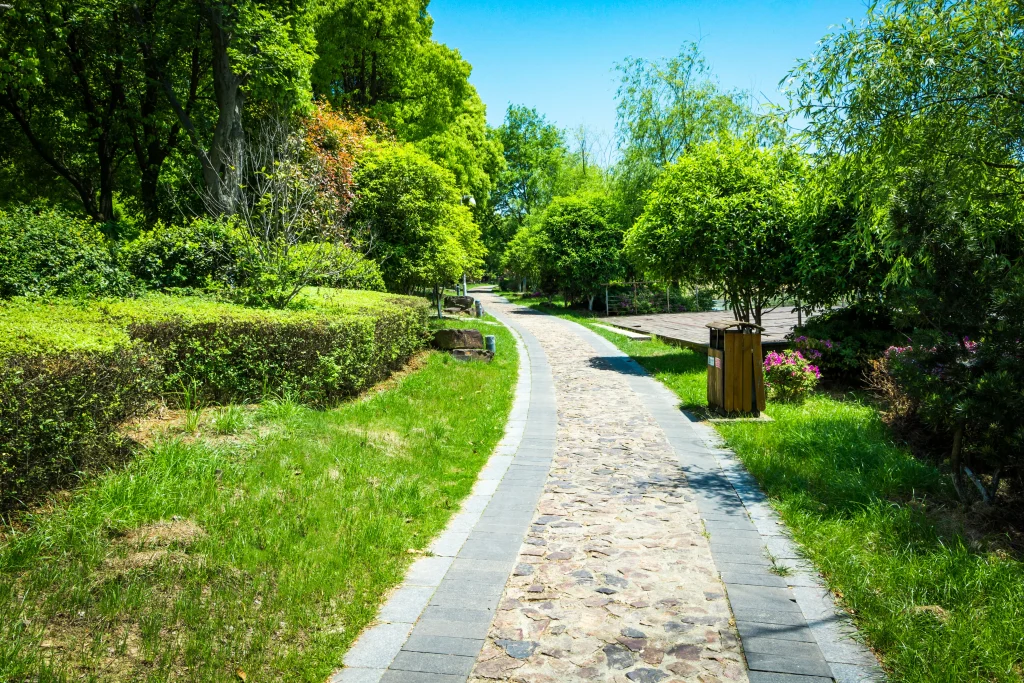What is the best time to water your grass? The best time to water your grass is in the early morning, typically between 5:00 am and 10:00 am. This timing allows water to penetrate the soil before excessive evaporation occurs while giving grass blades time to dry, preventing disease development.
In the Mile High City, proper lawn watering isn’t just about having a green yard – it’s about smart water management. When you water at the wrong time, you’re not only wasting a precious resource but potentially causing damage to your lawn.
Improper watering times can lead to:
- Water waste through evaporation
- Increased risk of fungal diseases
- Shallow root development
- Greater vulnerability to drought stress
- Higher water bills
Throughout this article, we’ll explore when, how much, and how often you should water your lawn in Denver’s unique environmental conditions. By understanding these factors, you’ll be able to maintain a healthy, resilient lawn while being a responsible steward of our water resources.
What Is The Best Time To Water Your Grass in Denver?
Early morning watering (5:00 am to 9:00 am) provides multiple benefits for your Denver lawn.
During this time, temperatures are cool, winds are typically calmer, and water has the opportunity to penetrate deeply into the soil before the intense sun begins to evaporate moisture.
Early morning watering also allows grass blades to dry thoroughly during the day, which significantly reduces the risk of fungal diseases that thrive in prolonged damp conditions.
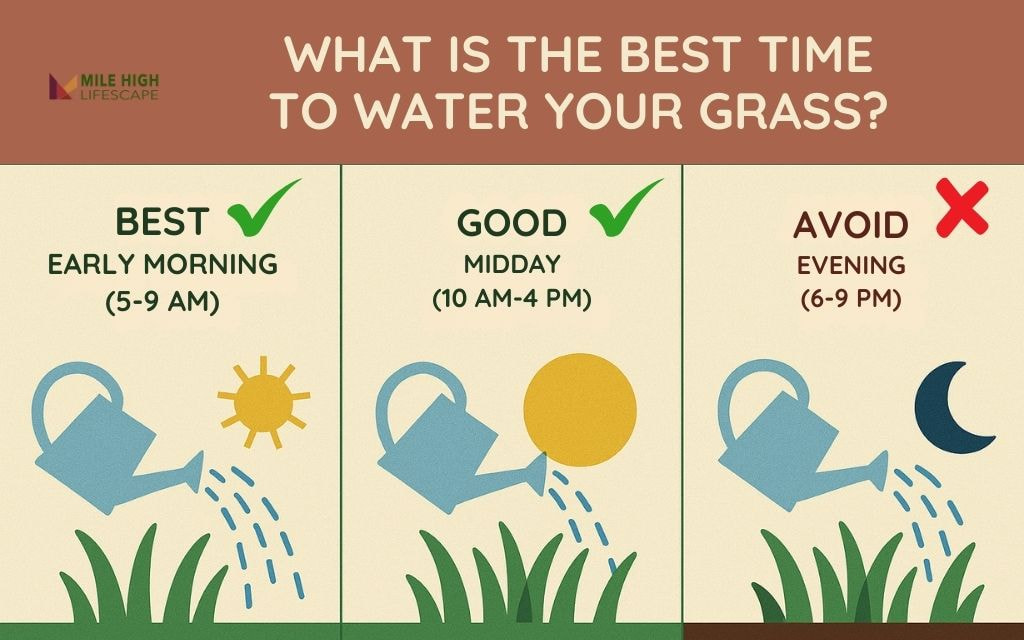
Let’s examine how different watering times affect your lawn:
| Time of Day | Pros | Cons |
| Morning (5-9 AM) | – Low evaporation rates – Better water absorption – Grass dries during day – Complies with water restrictions | – May require timer setup – Less convenient for manual watering |
| Midday (10 AM-4 PM) | – Convenient for homeowners – Easy to monitor | – High evaporation (up to 50%) – Water waste – Can cause heat stress to grass – Often violates water restrictions |
| Evening (6-9 PM) | – Lower evaporation than midday – Convenient for homeowners – Cooler temperatures | – Increased disease risk – Water sits on lawn overnight – Creates ideal environment for fungus – May attract pests |
Seasonal Adjustments for Denver’s Climate
While early morning remains the optimal time across seasons, the frequency and amount should be adapted based on seasonal conditions:
Spring (March-May)
- Begin watering when soil thaws and grass shows signs of growth
- Start with watering 1 day per week in early spring
- Water between 6:00 AM and 10:00 AM as temperatures are milder
- Gradually increase to twice weekly by late spring as temperatures rise
- Allow for natural precipitation to supplement your watering schedule
- Monitor soil moisture as spring brings variable conditions
Tip: In Denver’s spring, adjust your watering based on rainfall patterns, which can be highly variable. Early spring typically requires less supplemental water than late spring.
Summer (June-August)
- Water strictly between 5:00 AM and 8:00 AM before heat intensifies
- Follow Denver Water’s rules which typically allow watering 3 days per week
- Adjust schedule during heat waves or monsoon periods
- Consider cycle-soaking technique: multiple short cycles with breaks to prevent runoff
- Watch for signs of drought stress in hotspots and adjust accordingly
- Allow Kentucky bluegrass to go dormant during extreme drought if necessary
Tip: During Denver’s hot, dry summers, water deeply but infrequently to encourage deeper root growth that will make your lawn more drought-tolerant.
Fall (September-November)
- Reduce frequency to 1-2 times per week as temperatures cool
- Continue early morning watering between 6:00 AM and 10:00 AM
- Maintain consistent moisture during fall fertilization and aeration
- Don’t stop watering abruptly—gradually reduce as winter approaches
- Pay attention to dry spells common in Denver’s fall season
- Consider a final deep watering before winterizing irrigation system
Tip: Fall watering supports root growth that continues even as above-ground growth slows, setting your lawn up for success the following spring.
Winter (December-February)
- Generally, suspend regular irrigation during winter months
- Water only during extended dry periods (2+ weeks without snow cover)
- Water midday (10:00 AM to 2:00 PM) when temperatures exceed 40°F
- Ensure water won’t freeze on surfaces during application
- Target dry areas, south-facing exposures, and areas near structures
- Water at reduced volume – just enough to provide moisture to root zone
Tip: Denver’s winter watering is critical for newly established lawns and during dry spells when there’s no snow cover, but only water when the ground isn’t frozen and temperatures permit.
How Much and How Often Should You Water?
Understanding the right amount of water for your Denver lawn is just as important as knowing when to water. Our high-altitude climate creates unique watering needs that differ from other parts of the country.
Watering Depth and Frequency
- Weekly Water Needs: Aim for approximately 1 to 1.5 inches of water per week total (including rainfall) during the growing season. This amount may need to be increased during peak summer heat or reduced during cooler periods.
- Deep and Infrequent: Water deeply 2-3 times per week rather than daily light sprinklings. This encourages deeper root growth, creating a more drought-resistant lawn. In Denver’s clay-heavy soils, this approach helps prevent runoff while ensuring water reaches the root zone.
- Root Zone Depth: Water should penetrate 6-8 inches into the soil to properly hydrate the entire root zone of established turf. This depth encourages roots to grow deeper, making your lawn more resilient during dry spells.
- Seasonal Adjustments: Follow the 1-2-3-2-1 rule for Denver: water once weekly in spring, twice weekly in late spring, three times weekly during peak summer (if allowed), back to twice weekly in early fall, and once weekly in late fall.
- Watering Duration: For rotor sprinklers, run zones for approximately 30-45 minutes. For spray heads, which put out water faster, 8-12 minutes per zone is typically sufficient. Always adjust based on your specific system and lawn conditions.
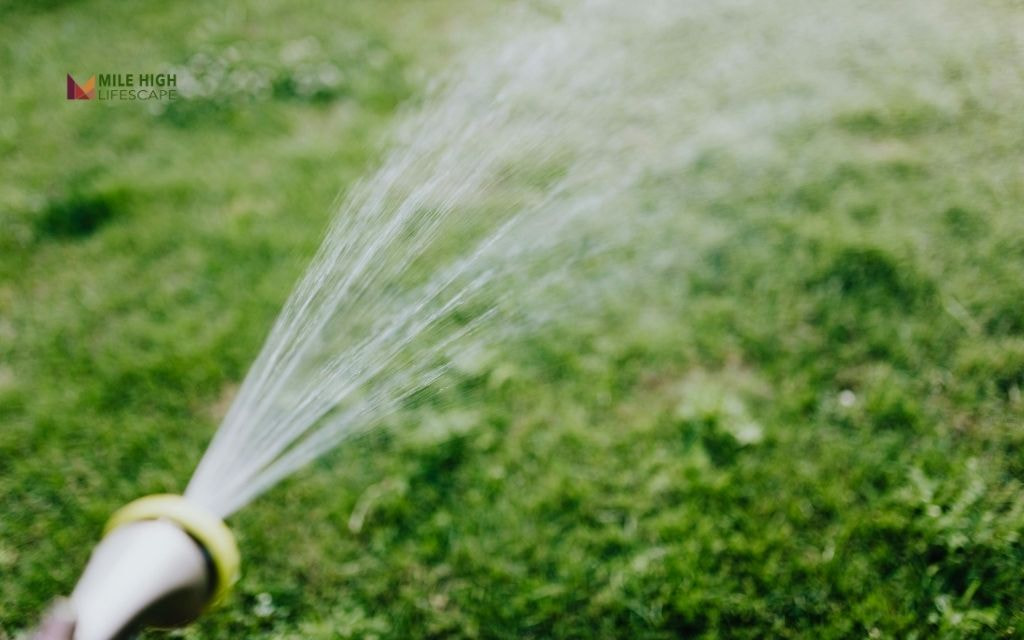
Measuring Water Application
To ensure you’re applying the right amount of water, use these simple measurement techniques:
The Tuna Can Test
- Place several empty tuna cans (or similarly sized containers) in different spots across your lawn
- Run your sprinklers for 15 minutes
- Measure the depth of water collected in each can
- Calculate the average depth across all cans
- Multiply by 4 to determine your hourly water application rate
- Adjust your watering time to apply the recommended 1-1.5 inches weekly, divided across your watering days
The Screwdriver Test
- Insert a 6-inch screwdriver into your lawn about 6-8 hours after watering
- If it penetrates easily to 6 inches, you’ve watered deeply enough
- If you encounter resistance, your soil needs more water or may be compacted
- Check multiple areas, especially those that tend to dry out first
Critical Factors Affecting Your Watering Strategy
In Denver’s unique climate, several factors influence how you should approach lawn watering.
Consider these variables before turning on your sprinklers:
Soil Type
Denver’s soil tends to be clay-heavy, which affects water absorption and retention:
- Clay soils: Hold water longer but absorb it slowly; water gently to prevent runoff
- Sandy soils: Drain quickly and need more frequent watering
- Loamy soils: Ideal balance of drainage and retention
Slope and Drainage
Denver’s variable terrain affects watering efficiency:
- Steep slopes: Use cycle-soaking (multiple short watering cycles with breaks) to prevent runoff
- Low areas: May need less frequent watering as they collect moisture
- Consider installing a smart controller that adjusts for slope conditions
Sun Exposure
Denver’s high altitude intensifies sun exposure effects:
- South-facing areas receive more intense sun and dry out faster
- Shaded areas retain moisture longer and need less frequent watering
- Consider creating irrigation zones based on sun exposure
Weather Forecast
Denver’s rapidly changing weather requires monitoring:
- Skip watering when rain is forecasted within 24 hours
- Increase watering during heat waves (while following restrictions)
- Consider a smart controller that adjusts based on local weather data
Watering System Type
Different irrigation systems have different efficiencies:
- Spray sprinklers: Apply water quickly but less efficiently; prone to drift in Denver’s winds
- Rotor sprinklers: More efficient with larger droplets that resist evaporation
- Drip systems: Most efficient but less common for lawns
- Adjust run times based on your specific system type
Local Water Restrictions
Denver Water frequently implements watering rules:
- Check current restrictions at denverwater.org
- Typically limited to 3 days per week during summer
- Usually prohibits watering between 10 AM and 6 PM
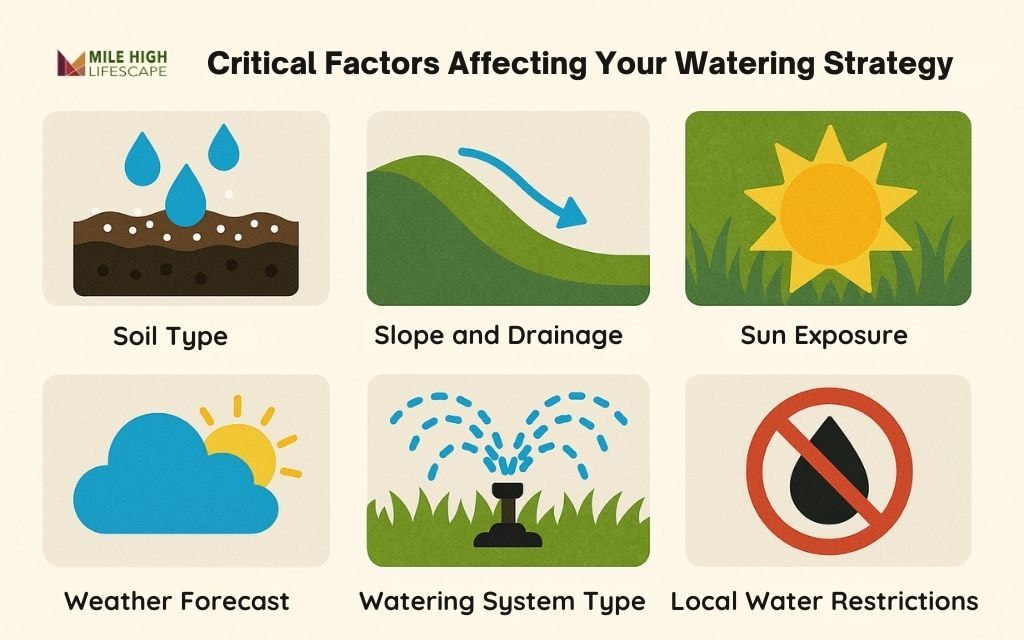
How to Tell If You’ve Watered Enough
Knowing when your lawn has received adequate water helps prevent both under-watering and over-watering issues.
Here’s how to determine if you’ve watered enough:
- Resilient Grass Blades: Properly watered grass bounces back quickly when stepped on instead of remaining flat.
- Appropriate Soil Moisture Depth: Moisture has penetrated 6-8 inches into the soil, encouraging deeper root growth.
- No Standing Water or Runoff: Water is absorbed into the soil rather than pooling on the surface or running off onto hardscapes.
- Consistent Color: Lawn maintains a uniform green color without dry, brown patches or overly dark green areas.
- Healthy Growth Rate: Grass grows at a steady pace without excessive surge growth (which indicates overwatering).
How to Water Different Types of Lawns
Denver homeowners have several grass options, each with distinct watering needs. Understanding these differences will help you maintain optimal lawn health while conserving water:
| Grass Type | Watering Frequency | Watering Depth | Special Considerations |
| Kentucky Bluegrass | 2-3 times per week in summer | 1-1.5 inches per week | – Most common in Denver – Has shallow roots (2-3 inches) – Can go dormant during drought – Recovers well when water returns |
| Tall Fescue | 1-2 times per week in summer | 1-1.25 inches per week | – Deeper root system (4-6 inches) – More drought-tolerant than bluegrass – Stays green with less water – Good for water-restricted areas |
| Fine Fescue Blends | 1 time per week in summer | 0.75-1 inch per week | – Excellent drought tolerance – Performs well in shade – Requires less maintenance – Less traffic tolerance |
| Buffalograss | Every 2-3 weeks or less | 0.5-0.75 inches per week | – Native to Colorado – Extremely drought-resistant – Needs minimal supplemental water – Goes dormant early in fall |
| Eco/Low-Water Blends | 1 time per week or less | 0.75-1 inch per week | – Mixed species for resilience – Designed for water conservation – Variable appearance – Often contains native species |
Common Mistakes When Watering Grass in Denver
Even with the best intentions, many Denver homeowners make watering mistakes that waste water and compromise lawn health.
Avoiding these common pitfalls will help you maintain a healthier lawn with less water:
- Watering too late in the day increases disease risk as grass remains wet overnight.
- Daily shallow watering encourages weak root development and drought susceptibility.
- Irrigating during windy conditions or midday sun wastes water through evaporation and drift.
- Allowing sprinklers to soak hardscapes not only wastes water but potentially violates Denver water regulations.
- Overwatering creates weak grass susceptible to disease and pests while encouraging weed growth.
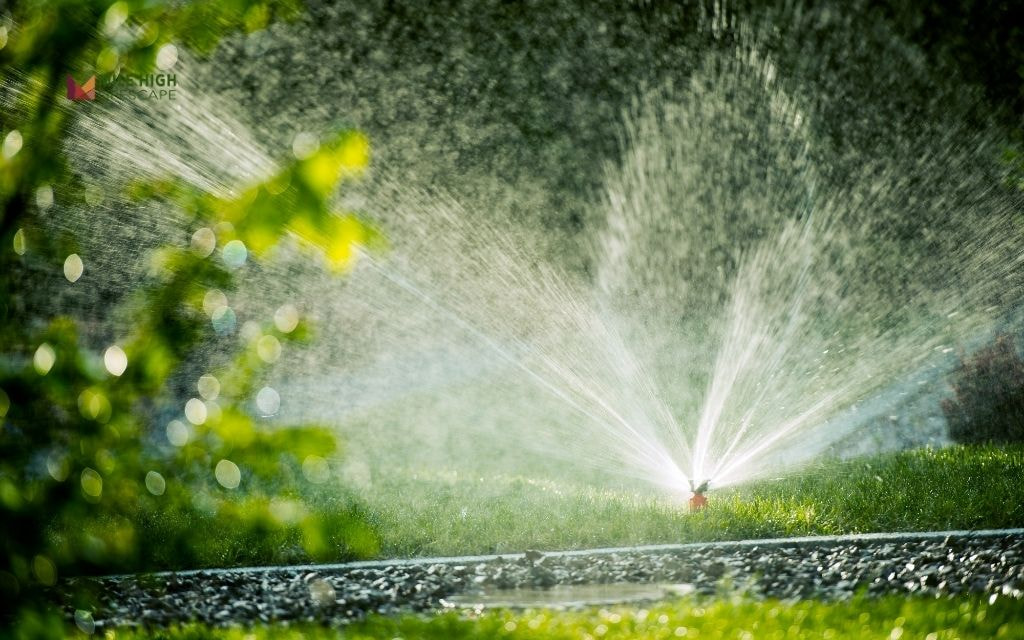
Conclusion
Early morning watering between 5-9 am provides the foundation for a healthy Denver lawn. Combine this optimal timing with appropriate seasonal adjustments, grass-specific considerations, and attention to soil conditions to develop an efficient irrigation strategy.
A properly watered lawn develops deep roots, remains resilient during drought periods, and resists disease and weed pressure. By following these evidence-based practices, you’ll maintain a vibrant landscape while conserving Colorado’s precious water resources.
For personalized irrigation strategies tailored to your specific landscape conditions, contact Mile High Lifescape. Our lawn care experts will analyze your property’s unique characteristics and develop a water-smart plan that promotes optimal lawn health while minimizing water usage.
Frequently Asked Questions (FAQs)
How many minutes should I water my lawn per zone?
In late spring, rotor irrigation zones typically need 30-45 minutes per zone, while spray irrigation zones require 8-12 minutes. Water 2-3 days per week during late spring for optimal results.
What is the best schedule for watering lawns?
Most Denver lawns need watering three days per week maximum in spring and summer, and two days weekly in fall under normal water supply conditions.
Should you water grass every day when it’s hot?
No. Daily watering encourages shallow root development and increases disease susceptibility. Even during heat waves, deep watering 2-3 times weekly promotes healthier, more drought-resistant turf than daily light sprinklings.
Can I water my lawn at 6pm?
If morning watering proves impossible, watering between 4 and 6 pm offers the next best option. This timing allows grass blades to dry before nightfall, reducing disease risk. However, evening watering remains less efficient than morning irrigation and should be considered a secondary choice.
What is the 1/2/3/2:1 lawn watering technique?
This technique provides a seasonal watering framework: April (1 day/week), May (2 times/week), Summer (3 times/week), September (2 times/week), and October (1 time/week). This graduated approach matches water application to seasonal needs while promoting deep root growth.
